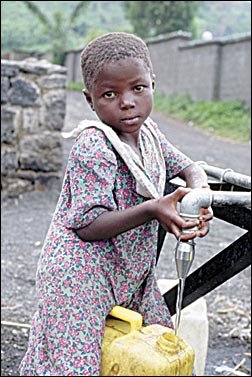A Woman's Work
(from http://www.water.org/)
Hello from Mekele, Ethiopia!
After a couple of full days of meetings, it was great to spend yesterday visiting three of our sites. The projects are doing well and moving forward according to schedule. Because of the direct tie to improved health, one of our project goals in Ethiopia is to increase household water consumption. Unfortunately, my site visits showed this challenge still seems to exist.
Overall, average usage seems to be lower than we’d like to see. Prior to the start of these projects, our partner organization reported that our communities’ average household consumption was about 4 gallons per day, which is not enough. (For comparison, in the US, we use around 178 gallons per day per person.) Our goal is to double average household consumption by the end of project.
At one of our sites, I visited the house of Berhanu, a local tap attendant. His community had just finished their project. It is a beautiful water system. As with all of our communities, the local water committee has established an operating fund to pay for future repairs or other problems. In this case, each household is charged a small, monthly fee in exchange for unlimited water usage rights. When I heard this, I immediately assumed that Berhanu and his family would be using a lot of water. After all, he’s the tap attendant, has the house closest to the tap, and has unlimited usage. But, while they may have been using more water, I still saw some very dirty children wandering around the house. One of the hardest things to see was that his youngest daughter had flies all over her face and eyes. All I could think of was how similar it was to what you’d see back home in TV reports from Africa. The hardest thing about seeing that was that the flies didn’t seem to bother her anymore. She didn’t wave her hands in front of her face or shake her head like you or I would. You could tell it was a common occurrence.
Before we left the site, I did get a chance to talk with Berhanu about the water project and how it had impacted him. I really wanted to find out how much water his family was using and whether he thought it was enough. But, even after talking with him, I’m still not sure if they aren’t using more water because they are used to conserving it or if more hygiene and sanitation education is needed.
On the ride back to the hotel, I talked about this observation with our partner organization. They’ve noticed the same problems and are continuing the hygiene education component of the project at this site and at a couple of sites with low water consumption. I hope that the continued emphasis on the links between hygiene and sanitation and the cycle of disease will continue to have an effect. My guess is that the next time I visit, I will see dramatic differences – I can’t wait!
Sarah BramleyWaterPartners InternationalProgram Manager





No comments:
Post a Comment